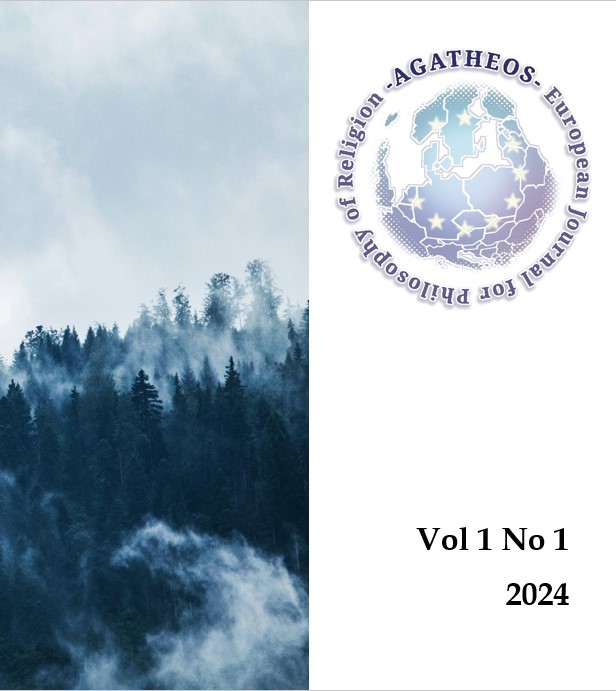Religious Diversity, Personal Knowledge, and Oblivious Salvation
DOI:
https://doi.org/10.69574/aejpr.v1i1.23020Keywords:
ineffability, salvation, union, grace, faithAbstract
In this paper, I employ recent work on divine ineffability (Jacobs, 2015) and personal knowledge (Benton, 2017) to argue that specific propositional knowledge cannot be required for salvation, where salvation is understood to involve a general claim about a person’s union with God. If this is true, I show that nobody can be excluded from salvation through mere happenstance of birth. Furthermore, I argue that adherents of this minimalist order of salvation ought to adopt a position of significant religious humility, for it is a consequence of this view that those with wildly divergent propositional beliefs about God, including people of different faiths, and even of no faith, can ultimately experience union with the same God. Although presented as an argument for salvific inclusivity, I conclude by showing that a similar argument can be adapted in defence of salvific pluralism. If there are no fundamentally true propositional beliefs about God to be had, each true claim made about God must be non-fundamentally true. Furthermore, just as there are multiple ways to truly, but non-fundamentally, describe the same object (ways that might contradict each other), so might there be multiple ways to truly, but non-fundamentally, describe God.
References
Alston, W. (1996). Belief, acceptance, and religious faith. In J. Jordan & D. Howard-Snyder (Eds), Faith, Freedom, and Rationality: Philosophy of Religion Today. London: Rowman & Littlefield.
Audi, R. (2011a). Rationality and Religious Commitment. Oxford: Oxford University Press. DOI: https://doi.org/10.1093/acprof:oso/9780199609574.001.0001
Audi, R. (2011b). Faith, Faithfulness, and Virtue. Faith and Philosophy, 28(3), pp. 294–309. DOI: https://doi.org/10.5840/faithphil201128328
Benton, M. (2017). Epistemology Personalized, The Philosophical Quarterly, 67 (269), pp. 813–834. DOI: https://doi.org/10.1093/pq/pqx020
Efird, D. & D. Worsley. (2017a). What an Apophaticist Can Know: Divine Ineffability and the Beatific Vision. Philosophy & Theology, pp. 1–15. https://doi.org/10.5840/philtheol20178478 DOI: https://doi.org/10.5840/philtheol20178478
Efird, D. and D. Worsley. (2017b), Divine Action and Operative Grace. The Heythrop Journal, 58: 771-779. https://doi.org/10.1111/heyj.12610 DOI: https://doi.org/10.1111/heyj.12610
Gould, J. B. (2008). The Grace We Are Owed. Faith and Philosophy, 25(3), pp. 261–275. DOI: https://doi.org/10.5840/faithphil200825326
Howard-Snyder, D. (2013). Propositional Faith: What It Is and What It Is Not. American Philosophical Quarterly, 50(4), pp. 357–372.
Jacobs, J. (2015). The Ineffable, Inconceivable, and Incomprehensible God: Fundamentality and Apophatic Theology. Oxford Studies in Philosophy of Religion, 6, pp. 158–176. DOI: https://doi.org/10.1093/acprof:oso/9780198722335.003.0007
Kittle, S. (2015). Grace and Free Will: Quiescence and Control. The Journal of Analytic Theology, 3(May), pp. 89–108. DOI: https://doi.org/10.12978/jat.2015-3.180813100804
Kvanvig, J. L. (2000). Affective Theism and People of Faith. Midwest Studies in Philosophy, 37(1), pp. 109–128. DOI: https://doi.org/10.1111/misp.12003
Maritain, J. (1951). On Knowledge through Connaturality. The Review of Metaphysics, 4(4), pp. 473–481.
Pojman, L. (1986). Faith Without Belief?. Faith and Philosophy, 3(2), pp. 157–176. DOI: https://doi.org/10.5840/faithphil19863213
Russell, H. (2010). Efficacious and Sufficient Grace. Philosophy and Theology, 22(1–2), pp. 353–372. DOI: https://doi.org/10.5840/philtheol2010221/217
Russell, N. (2004). The Doctrine of Deification in the Greek Patristic Tradition. Oxford: Oxford University Press.
Schellenberg, J. L. (2005). Prolegomena to a Philosophy of Religion. Ithaca: Cornell University Press.
Stump, E. (2003). Grace and Free Will. In E. Stump (Ed.), Aquinas: Arguments of the Philosophers. New York: Routledge, pp. 389–404.
Stump, E. (2007). Justifying Faith: Grace and Free Will. In R. L. Velkley (Ed.), Freedom and the Human Person. Catholic University of America Press, pp. 90-105.
Stump, E. (2010). Wandering in Darkness: Narrative and the Problem of Suffering. Oxford: Oxford University Press. DOI: https://doi.org/10.1093/acprof:oso/9780199277421.001.0001
Stump, E. (2012). Atonement and the Cry of Dereliction from the Cross. European Journal for Philosophy of Religion, 4(1), pp. 1–17. DOI: https://doi.org/10.24204/ejpr.v4i1.305
Stump, E. (2018). Atonement. Oxford: Oxford University Press. DOI: https://doi.org/10.1093/oso/9780198813866.001.0001
Stump, E. (2022). Image of God. Oxford: Oxford University Press. DOI: https://doi.org/10.1093/oso/9780192847836.001.0001
Suto, T. (2004). Virtue and Knowledge: Connatural Knowledge According to Thomas Aquinas. The Review of Metaphysics, 58(1), pp. 61–79.
Timpe, K. (2007). Grace and controlling what we do not cause. Faith and Philosophy, 24(3), pp. 284–299. DOI: https://doi.org/10.5840/faithphil200724313
White, V. (1944). Thomism and ‘Affective Knowledge’ (III). Blackfriars, 25(294), pp. 321–328. DOI: https://doi.org/10.1111/j.1741-2005.1944.tb05711.x
Published
How to Cite
Issue
Section
License
Copyright (c) 2024 David Worsley

This work is licensed under a Creative Commons Attribution 4.0 International License.
Authors of content published in the AGATHEOS retain the copyright to their works.
Articles are published under the terms of a Creative Commons CC BY 4.0 license, which permits use, downloading, distribution, linking to and reproduction in any medium, provided the original work is properly cited.



